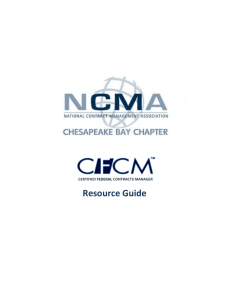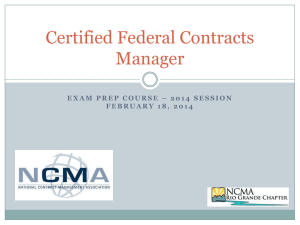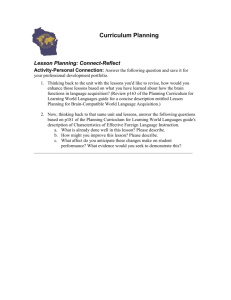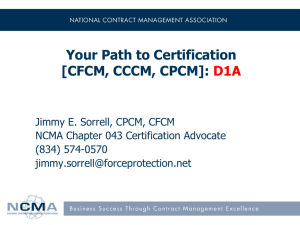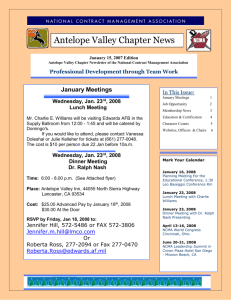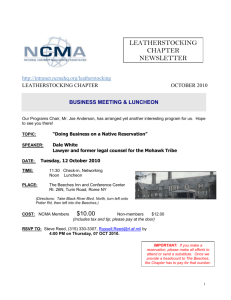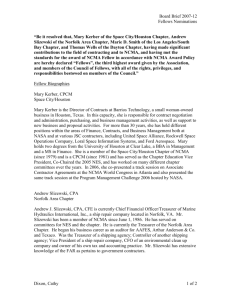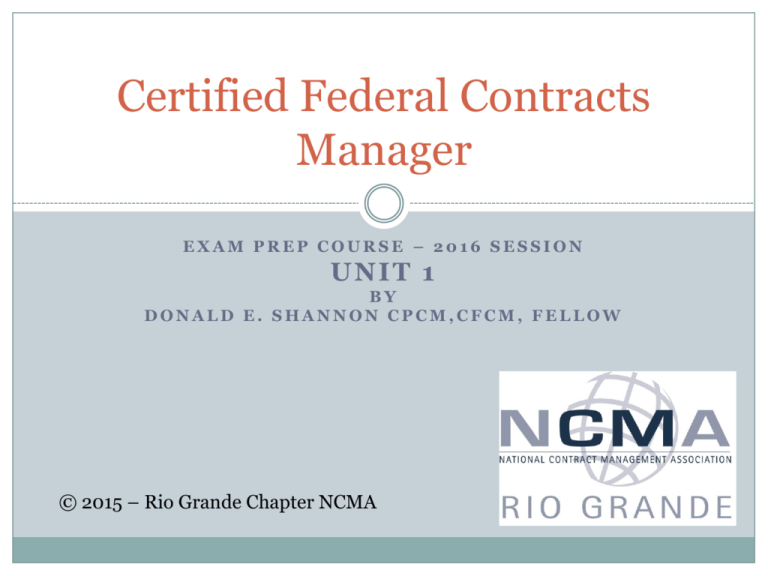
Certified Federal Contracts
Manager
EXAM PREP COURSE – 2016 SESSION
UNIT 1
BY
DONALD E. SHANNON CPCM,CFCM, FELLOW
© 2015 – Rio Grande Chapter NCMA
Copyright Notice
This presentation is the property of the Rio Grande Chapter of the National
Contract Management Association © 2015. All rights reserved. This presentation
is intended for the private, non-commercial use of the Rio Grande Chapter of the
National Contract Management Association (NCMA) for the education and
training of candidates seeking certification by the NCMA as a Certified Federal
Contracts Manager.
This presentation may not be duplicated, reproduced or used in any form or by
any means including photocopying and recording or by any information storage
and retrieval system without permission in writing from the publisher.
Foreword
This presentation is part of a series of tutorials designed
to assist a group of student prepare for the Certified
Federal Contract Manager Certification from the
National Contract Management Association.
It is not intended to be a stand-alone program. Rather it
is intended to be a component in a structured program of
study which includes:
A detailed review of the Federal Acquisition Regulation
The companion “Certified Federal Contracts Manager Study Guide”
Second or Third Editions
A knowledge of definitions included in the “Desktop Guide to Basic
Contracting Terms” Seventh Edition
Selected readings from Contract Management Magazine, The
Journal of Contract Management or other publications
Selected legal decisions
CFCM Requirements
A Bachelor’s Degree or higher from an accredited
university1
One year of experience
80 Hours of continuing professional education2
Successfully passing the CFCM exam
Subscribe to the Contract Management Code of Ethics
See: http://www.ncmahq.org/learn-and-advance/certification/cfcm/eligibility
1. Ten years experience may be considered in lieu of a degree. Contact NCMA
HQ (1-800-344-8096 or certification@ncmahq.org) for information.
2. CPE credits are awarded for this prep class 1 credit per 50 minutes
CPE Strategy
CPE for this study group – aprox. 18 – 20
CPE for DAU classes
CPE for College work over and above undergraduate
requirements
CPE for Chapter level NCMA training events or
seminars
Breakfast Seminars
Nuts Bolts and Beyond
CPE for NCMA HQ Sponsored training such as
National Education Seminars (NES)
80 CPE Requirement
What qualifies as CPE? Candidates may submit
records of training received for evaluation by NCMA.
CPE credit will be awarded based on NCMA’s
“Continuing Professional Education (CPE) Guide.”
Successfully completed college courses beyond
undergraduate degree requirements may be eligible.
The conversion formula is 15 CPE for each semester
hour, or 10 CPE for each quarter hour.
Study Group
This group will assist in preparing you for the CFCM
exam
Question. Have you registered for the exam
Application form is online
Application fee is $150 for NCMA Member or $275 for nonmember
Once application is approved – register for test
Online exam – Kryterion = $95.00
Paper exam – Through chapter = $50 Member - $90 non-member
This Is a Review Session
Our expectation is CFCM candidates are familiar
with the Federal Acquisition Regulation
CON 090 for Government Contracts Specialists
FAR Study Group for Others
This is NOT a spoon-fed program for those who have
not taken the time to read the FAR
This is a review of key concepts and terms associated
with Government contracting
We will go fast and if you have not prepared you will struggle
to keep up
What is a Contract Manager?
It depends …
Basically we prevent little problems from becoming
big problems
Communication
Negotiation
Interpretation
Facilitization
Many times we are a “Jack of all trades”
Accounting
Paralegal
Project Manager
What is a Contract Manager
Government usage
Contracting Officer (Warranted)
Contracts Specialist
Procurement Specialist/Buyer
Commercial use
Director / VP of Contracts (executive)
Contract Manager (senior)
Contract Administrator
Federal Contracts Management
Guided by extensive set of laws and regulations
Code of Federal Regulations (48 CFR)
Federal Acquisition Regulation
Departmental Supplements (e.g., DFAR)
Departmental policy
Case Law
Other policy/guidance
GAO
OMB
Federal Contracts Management
Our challenge
To know and apply the governing law and regulations to
specific actions
To conduct business on a professional basis
Ethical
Courteous / Polite
As a CFCM
You will be designated a professional
Similar in nature to a CPA or a PMP
You will be considered an authority
Many companies tie salary to certification levels
5 – 10% premium for CFCM
Duty to mentor
You and others have invested in your certification – pay it
forward.
Study Group Rules
Our assumptions
You are here to prepare for the CFCM exam
You meet the general eligibility requirement for a CFCM
certificate (less the test)
You have a working knowledge of the FAR through work
experience, FAR study group, or other means.
You have the CFCM study guide
This is your group – you will run it
You will be here each week ready to participate in
discussion.
Study Group Resources
CFCM Study Guide
On-Line access to the FAR
Other resources
Desktop Guide to Basic Contracting Terms
Contract Management Body of Knowledge*
Practice exams*
Proposed Schedule and Reading Assignments
Unit 1, March 2– Organization & Overview
Unit 2, March 23– Section 1A (to Page 18 of Second
Edition)
Unit 3, March 30 – Section 1B
Unit 4, April 6 - Sections 2 & 3
Unit 5, April 13– Section 4 and 5A (to page 72 of Second
Edition)
Unit 6, April 20– Section 5 Pages 72 to 84
Unit 7, April 27–Section 5 Pages 85 to 97
Unit 8, May 4 – Section 6 Pages 99 - 110
Unit 9, May 11– Mock Exams
Important Notice 1
Notice to CFCM Candidates: The CFCM Study Guide,
2nd Edition, was published in 2012 and contains FAR
changes through Federal Acquisition Circular (FAC)
2005-57. FAC 2005-83, effective October 1, 2015,
contains updates of inflation adjustments of
acquisition-related thresholds. CFCM candidates who
test on October 1 and later are responsible for knowing
the new thresholds. The 3rd Edition of the CFCM
Study Guide is scheduled to be published by January
2016.
1. NCMAHQ.ORG website Last accessed October 29, 2015
Exam Questions per FAR Part
Expect a total of 150
questions on the exam
If taken before April, 2016
the distribution of
questions by FAR Part is as
shown
If you take the new test
(after April 2016) the
distribution will be
changed slightly and there
will be no questions on less
used parts of the FAR like
Part 51.
NCMA Code of Ethics
THE CODE OF ETHICS OF THE NATIONAL
CONTRACT MANAGEMENT ASSOCIATION (NCMA)
ESTABLISHES PRINCIPLES FOR MEMBERS OF THE
CONTRACT MANAGEMENT PROFESSION. THIS
CODE IS INTENDED TO CREATE PUBLIC TRUST
AND CONFIDENCE IN THE INTEGRITY OF THE
CONTRACT MANAGEMENT PROCESS. THE CODE
REQUIRES MEMBERS OF THE CONTRACT
MANAGEMENT PROFESSION TO CONDUCT
THEMSELVES IN SUCH A MANNER AS TO BRING
CREDIT UPON THE PROFESSION. ALL MEMBERS
OF NCMA SHALL ABIDE BY THE LETTER AND
SPIRIT OF THIS CODE.
General Obligations1
Integrity:
Members fulfill their duties without deception or misleading practices. Members actively
support and encourage others in adhering to this code.
Accountability:
Members accept responsibility for their own conduct and performance.
Good faith:
Members conduct all business in good faith, make any required disclosures, and avoid
actual or apparent conflicts of interest (whether by reason of a financial interest, family
relationship, or any other circumstances).
Professionalism:
Members make themselves knowledgeable on all aspects of the contracting profession,
and apply this knowledge to the best of their ability to serve their employers, customers,
clients, business partners, and the public interest. This includes sharing one’s knowledge
and experience to contribute to the development of the profession. Members provide
objective advice free from improper influence.
1. See: http://www.ncmahq.org/discover-our-profession/code-of-ethics
General Obligations
Confidentiality:
Members protect confidential information concerning the business affairs of
any present or former employer, governmental agency, business partner, or
public body on which they serve.
Compliance with laws:
Members comply with all laws and regulations governing contract management
activities in all jurisdictions in which they conduct business.
Trust:
Members conduct themselves in such a manner as to establish and maintain
trust and confidence in the integrity of the contract management process.
Respect:
Members are respectful of others in the conduct of their professional duties.
Obligations to Profession
Professional reputation:
Members avoid disparaging statements affecting the professional
reputation of other contract management professionals.
Members act so as to bring credit upon the profession and the
association.
Mutual accountability:
Members hold each other accountable for compliance with this
code.
Professional development:
Members keep informed of developments in the contract
management field to maintain knowledge, skill, and professional
competence.
Obligations to Profession
Advancement by qualification:
Members encourage hiring and promotion within the contract
management profession based upon an individual’s professional
qualifications.
Professional qualifications and certification:
Members make only truthful claims concerning professional
qualifications, certification status, or experience. Members use
any professional certification or designation only in accordance
with the practice and rules of NCMA or other certifying or
granting body that granted the certification or designation.
Obligations to the Association
Service:
Members offer service to the association willingly, including
serving in chapter and national offices without compensation, in
order to advance the profession of contract management.
Violations:
Members report any suspected violations of this code to an
official of NCMA at the appropriate level (chapter or national).
Violations of this code are subject to discipline in the judgment
of NCMA up to, and including, revocation of membership and
certification. Members shall not retaliate in any form against
anyone who raises a valid concern under this code.
Government Contracting
Overview
LET’S SET THE STAGE
Government Contract Law Basics
Contract Laws are enacted by
Congress, implemented by the
Executive Branch and interpreted by
the Judiciary
As the sovereign, the government
enjoys certain protections and
privileges
Sovereign Immunity
Termination for Convenience
Socio-economic programs
“Necessary and Proper” clause of the
U.S. Constitution
Appropriation of funds
Government Contract Law Basics
Substantive laws affecting procurement
Armed Services Procurement Act
Federal Property and Administrative Services Act
Competition in Contracting Act
Streamlining Acquisition Regulations Act
Authorizations and Appropriations
Authorization act allows congress to propose
appropriations within a defined ceiling
Appropriation provides funding to a specific agency
for a defined purpose.
Budgeting Basics
Budgeting Process
Inputs aggregated by OMB
OMB negotiates with
agencies to compile
proposed budget
Congress (House) then
establishes Authorized and
Appropriated budgets
Senate provides additional
input
Final budget is passed by
Congress and sent to
president for signature
Budgeting Basics
Approved budget sent to
OMB who then allocates
it to each agency
Continuing Resolution
Essentially extends earlier
period’s authorized and
appropriated budget into
next fiscal period
Severely restricts new
acquisitions while
continuing to fund existing
contracts.
Budgeting Basics
Restrictions on
Government funds
Purpose for which they may
be used (“color of money”)
Limit on time frame in
which those funds may be
spent i.e., obligated
O&M (057 3400)
R&D (057 3600)
Military Construction (057
3300)
One Year (FY 2013)
Two Year (FY 2013-14)
Payment may extend over
several years for money
obligated in current year.
Funding Obligations – FPDS-NG
Applying the Law to a Specific Federal
Contracting Instance
FAR
DFAR
OMB Circulars
Office of Federal
Procurement Policy
Agency Policy
Case Law
“Restatement of the
Law”
Contract Interpretation
Contracting professionals should always seek to
resolve differences in the least formal and most
collaborative manner possible.
It is important for contract managers to understand
contract interpretation principles in order to avoid
and/or settle disputes.
Judicial and administrative bodies interpret the
contract language to determine the outcome of any
dispute if it cannot be settled at a lower level.
Contract Interpretation
Main point of contract interpretation is to determine
a single interpretation of the contract that reflects
the parties' intent.
1) Know/Read your Contract
2) Understand Key Terms
3) Extrinsic Evidence
Know Your Contract
Before signing contract make sure that all parts work
together and that there is no ambiguity.
If one section of the contract may conflict with another, the
parties should use an "order of precedence" clause to determine
which section takes priority.
According to the FAR, any inconsistency shall be resolved by
giving precedence in the following order:
o The schedule (excluding the specification);
o Representations and other instructions;
o Contract clauses;
o Other documents, exhibits, and attachments; and
o The specifications. (Derived from FAR 52.214-29 and 52.2158.)
Understand Key Terms
Key term is not defined in the contract, then technical
terms are given their technical meaning in that field.
Negotiated terms take precedence over standard terms.
o “Boiler plate“ = Standard terms that may be pre-printed
on a form.
Specific terms take precedence over general terms.
If a term has several different meanings, it is interpreted
against the party who wrote the ambiguous term.
Extrinsic Evidence
Discussions and concurrent actions,
For example, discussions, meetings, teleconferences, e-m ails, or conduct
submitting bids, quotes, or proposals may establish the intent of the parties
about the disputed terms. In addition, the parties' behavior after contract
award, but before the controversy, may also provide insight how to interpret
the disputed terms.
Prior course of dealing between the parties, and
A prior course of dealing can establish precedence based on past actions;
thus, it can be used to establish the intent of the parties.
Custom and trade usage.
For the Purposes of this Group
We will only consider the Federal Acquisition
Regulation (FAR)
Open acknowledgment that other sources may apply to your
day-to-day activities
We will not consider departmental supplements
We will not consider departmental policy
This approach establishes a “level playing field” for
contracting professionals seeking the CFCM
credential
So .. For now none of those “other sources” are being
considered and we will focus strictly on the FAR
Welcome to the FAR
A QUICK OVERVIEW OF WHAT’S AHEAD
Role of the Federal Acquisition Regulation (FAR)
Principle source of
contracting guidance
within the Federal
Government
Implemented April 1,
1984
“FAR System”
comprised of
FAR
Agency Supplements
(e.g., DFAR)
48 CFR – Federal Acquisition Regulation System
CHAPTER 1 - FEDERAL ACQUISITION REGULATION
CHAPTER 2 - DEFENSE ACQUISITION REGULATIONS SYSTEM,
DEPARTMENT OF DEFENSE
CHAPTER 3 - HEALTH AND HUMAN SERVICES
CHAPTER 4 - DEPARTMENT OF AGRICULTURE
CHAPTER 5 - GENERAL SERVICES ADMINISTRATION
CHAPTER 6 - DEPARTMENT OF STATE
CHAPTER 7 - AGENCY FOR INTERNATIONAL DEVELOPMENT
CHAPTER 8 - DEPARTMENT OF VETERANS AFFAIRS
CHAPTER 9 - DEPARTMENT OF ENERGY
CHAPTER 10 - DEPARTMENT OF THE TREASURY
CHAPTER 12 - DEPARTMENT OF TRANSPORTATION
CHAPTER 13 - DEPARTMENT OF COMMERCE
CHAPTER 14 - DEPARTMENT OF THE INTERIOR
48 CFR – Federal Acquisition Regulation System
CHAPTER 15 - ENVIRONMENTAL PROTECTION AGENCY
CHAPTER 16 - OFFICE OF PERSONNEL MANAGEMENT FEDERAL
EMPLOYEES HEALTH BENEFITS ACQUISITION REGULATION
CHAPTER 17 - OFFICE OF PERSONNEL MANAGEMENT
CHAPTER 18 - NATIONAL AERONAUTICS AND SPACE ADMINISTRATION
CHAPTER 19 - BROADCASTING BOARD OF GOVERNORS
CHAPTER 20 - NUCLEAR REGULATORY COMMISSION
CHAPTER 21 - OFFICE OF PERSONNEL MANAGEMENT, FEDERAL
EMPLOYEES GROUP LIFE INSURANCE FEDERAL ACQUISITION
REGULATION
CHAPTER 23 - SOCIAL SECURITY ADMINISTRATION
CHAPTER 24 - DEPARTMENT OF HOUSING AND URBAN DEVELOPMENT
CHAPTER 25 - NATIONAL SCIENCE FOUNDATION
CHAPTER 28 - DEPARTMENT OF JUSTICE
CHAPTER 29 - DEPARTMENT OF LABOR
48 CFR – Federal Acquisition Regulation System
CHAPTER 30 - DEPARTMENT OF HOMELAND SECURITY, HOMELAND SECURITY
ACQUISITION REGULATION (HSAR)
CHAPTER 34 - DEPARTMENT OF EDUCATION ACQUISITION REGULATION
CHAPTER 51 - DEPARTMENT OF THE ARMY ACQUISITION REGULATIONS
CHAPTER 52 - DEPARTMENT OF THE NAVY ACQUISITION REGULATIONS
CHAPTER 53 - DEPARTMENT OF THE AIR FORCE FEDERAL ACQUISITION
REGULATION SUPPLEMENT [Reserved]
CHAPTER 54 - DEFENSE LOGISTICS AGENCY, DEPARTMENT OF DEFENSE
CHAPTER 57 - AFRICAN DEVELOPMENT FOUNDATION
CHAPTER 61 - CIVILIAN BOARD OF CONTRACT APPEALS, GENERAL SERVICES
ADMINISTRATION
CHAPTER 63 - DEPARTMENT OF TRANSPORTATION BOARD OF CONTRACT
APPEALS
CHAPTER 99 - COST ACCOUNTING STANDARDS BOARD, OFFICE OF FEDERAL
PROCUREMENT POLICY, OFFICE OF MANAGEMENT AND BUDGET
Chapter 1 – Federal Acquisition Regulation
Subchapter A – General (parts 1-4)
Subchapter B – Competition and Acquisition Planning
(parts 5-12)
Subchapter C – Contracting Methods and Contract Types
(parts 13-18)
Subchapter D – Socioeconomic Programs (parts 19-26)
Subchapter E – General Contracting Requirements
(parts 27-33)
Subchapter F – Special Categories of Contracting (parts
34-41)
Subchapter G – Contract Management (parts 42-51)
Subchapter H – Clauses and Forms (parts 52 & 53)
The FAR Council
FAR is prepared, issued,
and maintained jointly
by:
Secretary of Defense
Administrator of GSA
Administrator of NASA
Two councils who must
agree to all changes
Defense Acquisition
Regulation Council
(DoD/NASA)
Civilian Agency Council
(GSA)
FAR is published and
distributed by FAR
Secretariat (GSA)
Richard T. Ginman
Director, Defense
Procurement &
Acquisition Policy,
Department of
Defense
Mr. Jeffrey A. Koses
Senior Procurement
Executive General
Services
Administration
Mr. William P. McNally
Assistant Administrator
for Procurement
National Aeronautics
and Space
Administration
Proposed Changes to the FAR
Proposed changes are
published in the Federal
Register
Know as “FAR Cases”
Public Comment Period
Adoption of proposed
change announced in
Federal Register
Electronic copy of FAR
updated with revision
Coming Next Week
Class #2
Read Pages 1 thru 18 of the Study Guide
FAR Part 1 – The FAR System
FAR Part 2 – Definitions of Words and Terms
FAR Part 3 - Improper Business Practices and
Personal Conflicts of Interest
FAR Part 4 – Administrative Matters
FAR Part 5 – Publicizing Contract Actions
FAR Part 6 – Competition Requirements

